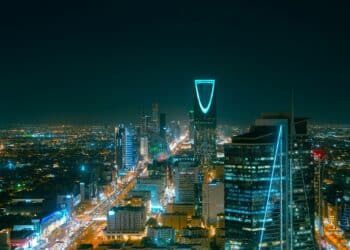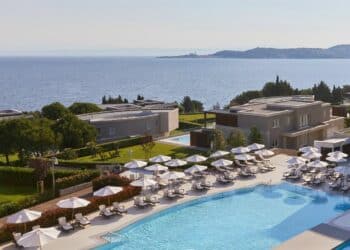
Lebanon’s hotel industry is showing strong signs of recovery as tourism arrivals pick up and infrastructure enhancements get underway
PROJECTS & DEVELOPMENTS
Rural Tourism Strategy for Lebanon: Launched by the Ministry of Tourism last year, this 50-page plan aims to promote Lebanon’s rural and eco tourism credentials. It’s project funded by the United States Agency for International Development and involves marketing existing destinations, developing new attractions and improving environmental and cultural conservation efforts.
Waterfront City: This destination, located on the 700-berth La Marina Joseph Khoury, is already under construction. It’s a maritime-inspired residential area with leisure, hospitality, business and retail components. Built on an area of land similar in size to the marina in Monte Carlo Monaco, the Majid Al Futtaim project will include a state-of-the-art business park and several hotels.
Beirut Terraces: A ‘vertical village’ encompassing 130 luxury ‘living spaces’.
Upcoming hotels include:
- Coral Beirut Concorde Hotel (61 keys)
- Summerland Kempinski Resort, Beirut (151 keys)
- Grand Hills, a Luxury Collection Resort, Broumana, Lebanon (118 keys plus 52 apartments)
MARKET ANALYSIS
Lebanon’s tourism industry, battered by the domestic and region political tensions that have prevailed over the past few years, has demonstrated early signs of improvement in 2015.
Tourist arrivals increased for the ninth consecutive month in February 2015 and increased 20.5% to 175,859 visitors in the first two months of the year.
The Gulf countries are driving Lebanon’s tourism industry resurgence with visitors from Qatar, Saudi Arabia and the UAE increasing by double digits year on year. Tourists from Egypt and Iraq are also returning in large numbers.
Colliers International is forecasting a hotel occupancy rate of up to 49% for Beirut hotels this year and predicts that RevPAR across the city’s three-, four- and five-star hotel market will increase 1% year on year to US$78. ADR, it says is expected to hit $158.
According to a Bank Audi Research Center report this improvement in tourism and hotel guest numbers is supported by a rise in passenger traffic at Beirut Rafic Hariri International Airport, which increased 10.24% year-on-year in the first two months of 2015.
This amounted to 419,369 passenger movements, which is a record high for this period.
A March 2015 SGBL Eco News Report quoting figures from the Institute of International Finance (IIF) predicts a 7.9% increase in tourism receipts to reach $6.4 billion this year. A further increase of around 12% is forecast for 2016, taking the tourism receipts total to $7.2 billion.
The Lebanese government has taken a proactive stance over the last 12 months, launching advertising campaigns that highlight the country’s divers tourism offering, from trendy beaches and a vibrant shopping and nightlife scene to mountain ranges, ancient cities and architectural heritage.
Lebanon’s Ministry of Tourism kick-started the ‘Live, Love, Lebanon’ campaign in April 2014 indicating the government’s commitment to reviving the country’s tourism sector, which is a key driver of economic growth.
According to the World Travel and Tourism Council’s Lebanon 2014 report, the direct contribution of travel and tourism to GDP was $3.2 billion (6.9% of total GDP) in 2013. The indirect contribution was $9 billion or 19.2% of GDP. In 2015 these figures are forecast to rise by 2.1% and 2.2% respectively.
Performance peak
Naureen Ahmed, manager, marketing and analysis at STR Global, says Lebanon’s hotel industry is susceptible to regular performance fluctuations due to its location.
“The country is not only impacted by its own conflicts, but those in neighbouring countries such as Syria,” she notes.
“However, we have started to see some recovery since the summer of 2014 and this trend has continued into the first quarter of 2014.”
She notes that Q1 occupancy levels remain below 50%, but year on year they have witnessed 30.9% growth. This is being mirrored by ADR and RevPAR growth, which year to date (March 2014-March 2015) have improved by 10.4% and 44.5% respectively.
Ahmed says there has been “next to no supply growth” in Lebanon over the past few years, yet demand has improved consecutively over the past 11 months, which is helping to boost occupancies and drive rate performance.
What the hoteliers say
A strong increase in visitor numbers from the UAE and Iraq is driving up occupancies at the Raouché Arjaan by Rotana in Beirut, reveals general manager Hala Massaad.
“Over the past year occupancy has averaged 82% at Raouché Arjaan by Rotana and 85% at Gefinor Rotana,” she says. “We believe the stable situation in the country will sustain tourism industry growth.”
The central location of both properties and their high service standards has paid dividends during times of trouble she adds. Gefinor Rotana, voted leading business hotel in the Middle East for the past six consecutive years, is conveniently located in Hamra, near the main business districts and at a walking distance from main shopping streets, restaurants and nightlife. Raouché Arjaan by Rotana, the winner of the World Travel Award as the leading business hotel in Lebanon, overlooks the Pigeon rock and the Mediterranean Sea and is 10 minutes away from downtown Beirut.
Ongoing promotions for food and beverage, accommodation, and banquet rooms have also stimulated demand, adds Massaad.
Gefinor Rotana general manager Franck Royer concurs that festive, Ramadan and corporate packages have pulled in the punters.
“We recently launched the Escapes campaign featuring an attractive range packages for all requirements, from romantic gateways and family holidays to long stay and business deals,” he says.
Innovative food promotions are helping to bump up the revenues too, with the hotel’s gourmet week, which focused on gluten-free food, proving a hit. Value-add campaigns such as free Wi-Fi when booking through Rotana.com have also achieved good results, adds Royer.
Guests from Iraq, Syria, Egypt, Jordan and some European countries are Gefinor Rotana’s bread-and-butter business.
“While the drop in Lebanon’s GCC visitors has greatly affected tourism to the country in general, this market still accounts for a large percentage of our guests,” he says.
“We also aim to target new markets through our GSO global sales offices located in Abu Dhabi, Dubai, China, Germany, India, Kuwait, Russia, Saudi Arabia and the UK.”
Massaad says 2015 prospects are good because Lebanon has made good progress with security enhancements and tourism-focused campaigns.
“We have high hopes for years ahead; however, our main challenge as a hotel industry is the ongoing situation in surrounding countries and the difficulties we face convincing the world that things are stable here in Lebanon.”
HMH – Hospitality Management Holdings, which currently operates two centrally-located properties in Beirut (Coral Beirut Al Hamra Hotel and EWA Beirut Raouche Hotel) and is due to open a third, Coral Beirut Concorde Hotel, later this year, says the city’s hospitality market has stabilised in 2015.
“The performance of our properties is in line with the market and I must say we are doing quite well,” notes CEO Laurent Voivenel. “I believe the market in absolute terms will continue to grow from both a supply and demand perspective.”
He says Beirut always bounces back because it’s “one of the liveliest cities in the region with breath-taking sights and scenery, fabulous nightlife, amazing shopping centres and thrilling sports opportunities”.
“However, demand is heavily reliant on political stability and security. Any kind of market shock can result in fluctuations in revenues from one day to the next.”
The 12-month prospects look promising, he continues, with business equally split between Europe, Arab countries and the rest of the world.
“Having said that, our immediate neighbours are among the most important markets for us as they travel year-round rather than just in the peak season,” Voivenel adds.
To keep HMH properties top of mind, the hospitality firm has been running a series of road shows in key source markets like KSA, Jordan, Egypt and other parts of GCC, as well as conducting marketing campaigns to generate awareness about its properties in Lebanon.


































































